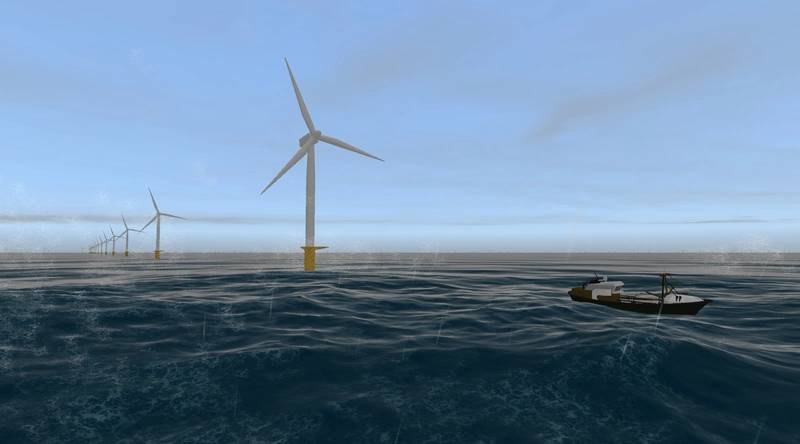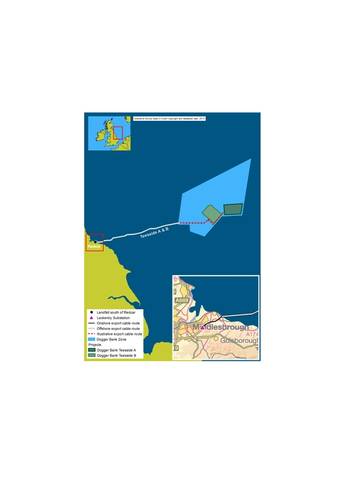Today’s planning approval for offshore wind energy at Dogger Bank takes the total of consented projects in the North Sea zone to 4.8 gigawatts (GW), almost equal to all the offshore wind capacity now in operation in the U.K.
The consented development, Dogger Bank Teesside A&B is part of the Dogger Bank Zone, the largest of the Round 3 zones and the farthest from shore, but also one of the shallowest, with high wind speeds and seabed conditions ideally suited to offshore wind development.
The consent is offshore wind consortium Forewind’s second approval following that of Dogger Bank Creyke Beck in February. Both consented developments have a proposed installed capacity of 2.4GW making them the equal largest renewable energy applications ever to be approved in the U.K., and together the world’s biggest planned offshore wind scheme.
The Rt Hon Amber Rudd MP, Secretary of State for Energy and Climate Change, approved the application for Dogger Bank Teesside A&B, submitted to the Planning Inspectorate by Forewind in March 2014.
The consent approval of the 2.4 GW Dogger Bank Teesside A&B development allows for two separate 1.2GW projects, each with up to 200 turbines installed across an area of around 600km2 and located 165 kilometers from the U.K. coast at the closest point.
The Dogger Bank Teesside A&B consent approval is the result of more than four years of comprehensive assessments, community and stakeholder consultation, and planning by the consortium, owned equally by the four international energy companies – RWE, SSE, Statkraft and
Statoil (STO). This work included the most extensive study of an offshore area ever undertaken by a wind energy developer, with more than £60 million spent on surveys, the vast majority going to U.K.-based contractors.
Energy and Climate Change Minister Lord Bourne said, “Thanks to Government support the U.K. is the world leader in offshore wind energy. As we build the Northern Powerhouse, we want local communities to reap the benefits of investment and green jobs from low carbon developments like Dogger Bank Offshore wind project.”
The power from Dogger Bank Teesside A&B will come to shore between Redcar and Marske-by-the-Sea, in Teesside and the nine kilometer onshore cable will connect into the national grid at the existing Lackenby Substation, adjacent to the Wilton International industrial complex.
When constructed, Dogger Bank Teesside A&B will be one of U.K.’s largest power generators, equal to Dogger Bank Creyke Beck and second only to the 3.9GW Drax coal-fired station in North Yorkshire.
It would be capable of generating 8 terrawatt hours (TWh) of green energy per annum, which is more than enough to power all the commercial and industrial consumers in the North East every year and equal to the amount used annually by approximately two million British homes.
Forewind General Manager, Tarald Gjerde said that the planning approval has been achieved following extensive consultation with interested parties and a rigorous governmental review. Combined with the positive seabed survey results and strong wind measurements, the consent confirms Dogger Bank’s suitability for large-scale offshore wind development. Today’s approval paves the way for the phased delivery of wind projects across Dogger Bank.
“It represents a real opportunity for the U.K. to receive even more of its energy from its abundant wind resource while creating significant economic benefits, particularly for the north eastern regions,” he said.
Dogger Bank Teesside A&B could create up to 4,750 new direct and indirect full time equivalent jobs and generate more than £1.5 billion for the U.K. economy, with the majority of opportunities in the North East and Yorkshire and the Humber regions.
“These local regions are well positioned to take advantage of the many supply chain and employment opportunities, due to both their geographical proximity to the development as well as their industrial and marine heritage, with existing skills in large-scale production activities and a history of offshore support.”
“The consent is a credit to the outstanding efforts made by both the Forewind project team members and the many seasoned consultants and expert suppliers who contributed to the application,” Gjerde added.
The Crown Estate, manager of the U.K. seabed, awarded the rights to develop the Dogger Bank Zone to Forewind in early 2010. Huub den Rooijen, Head of Offshore Wind at The Crown Estate, said, “Today’s announcement marks a great success for the future of the U.K.’s infrastructure development and is testimony to the hard work of Forewind and the wider offshore wind industry in getting these large scale projects through the planning system.
“The scale of the Dogger Bank projects offers a significant opportunity to continue to drive down costs, create high value jobs and support the U.K.’s transition to a low carbon
energy supply.”
As part of the consent process a final six-week legal challenge period will now be undertaken.














